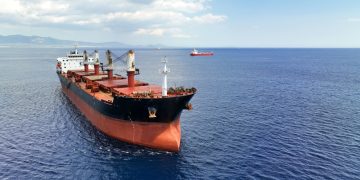The Coastal Sustainability Alliance (CSA), an industry collaborative effort led by Kuok Maritime Group (KMG), announced the commencement of shipbuilding of the first fully electric PXO tug (e-tug) and supply boat (e-supply boat) by PaxOcean Group.
This marks a milestone in the collective industry effort to accelerate coastal decarbonisation, transition to a circular economy and strengthen marine supply chains.
These zero-emissions vessels are among the first and largest local electric harbour craft designed for operation in Singapore’s coastal waters. They are targeted for deployment in 2025, ahead of the nation’s goal for all new coastal vessels to be fully electric or operate on low-carbon energy solutions by 2030.
The new CSA members hail from diverse sectors, including finance, green energy, corporate and environmental consultancies, and maritime services, and exemplify the growing support network for advancing Singapore’s maritime decarbonisation efforts. These new members are CIMC Energy Storage, DBS, Grant Thornton, Hanhwa Aerospace, KST Maritime, Marina Offshore, Paia Consulting, Siemens Energy, and Transport Capital. Together with the current members, they will be instrumental in propelling CSA’s next growth phase, focusing on green financing, ESG initiatives, vessel adoption, electrification, and technology enhancement for the coastal logistics ecosystem.
The expansion of the Coastal Sustainability Alliance and the commencement of construction for the PXO e-tug and e-supply boat signify a pivotal growth phase to create new revenue streams and scale the CSA ecosystem globally together with our alliance members.
…Mr. Tan Thai Yong, Managing Director, Strategic Projects and Technology, Kuok Maritime Group and Chairperson, CSA Council, said.
The CSA enters its third year with a continued commitment to build a next-generation coastal logistics ecosystem. Progress made in its five strategic areas include:
- Commercialisation of Singapore design-build-deploy PXO e-tug and e-supply boat – Pacific Workboats Pte Ltd (PWPL) has committed to purchasing the e-tug, leveraging its capabilities to provide sustainable towage services for its customer base. Additionally, KMG is investing in the construction and trials of the e-supply boat. While efforts to charter out the e-supply boat are ongoing, commercial interest in the PXO series continues to grow, with several CSA members exploring opportunities to charter these next-generation vessels. The PXO e-tug and e-supply boat are slated for deployment in 2025, marking a significant milestone in commercialising the PXO series.
In February 2024, the CSA was among the shortlisted entities announced by MPA ’s Expression of Interest (EOI) to transform Singapore’s maritime sector by designing and developing electric harbour craft. Among the 11 proposals received, the CSA’s e-supply boat proposal was among the six that have secured the relevant technical approvals from Classification Societies and were chosen for further design enhancements and optimisation with institutes of higher learnings (IHLs) and research institutes. This is significant progress and endorsement of the high technology readiness and maturity of the CSA’s PXO electric vessels.
- Promoting sustainable resource management through e-waste reduction, upcycling and biofuels – Since 2023, CSA has partnered with Green COP to develop and commercialise second-generation biofuels as a transition fuel to reduce emissions from conventional harbour craft. Green COP has secured S$500,000 in angel investment to build a prototype plant to produce Biobutanol. The biofuel is made from biomass feedstock and generates fewer emissions than petroleum fuels.
- Reduce marine traffic by 20% through logistics and fleet optimisation solutions – A key part of CSA’s efforts is to seamlessly integrate logistics, fleet operations, battery performance and just-in-time operations for vessels, terminals, and service providers. Utilising advanced technologies in artificial intelligence (AI) and machine learning, the CSA is conducting optimisation simulations with MagicPort on the coastal logistics platform, which is expected to go live by end-2024. This platform will support the PXO e-supply boat in meeting the growing demand from the shipping community for marine logistics optimisation and traffic flow. The e-tug will also explore demand-supply match optimisation to reduce fuel wastage and dead mileage.
- Support the growth of SMEs and start-ups through a sustainable green supply chain and maritime business ecosystem – Currently, over 50% of components of the PXO vessels are sourced locally. Sea Forrest Power Solutions is in conversation to supply critical components such as motors, battery management systems, and batteries for the e -supply boat.
The CSA aims to partner with the Singapore Association of Shipsuppliers and Services (SASS) to upgrade sustainability competencies within the maritime workforce and facilitate a just transition for all SASS members towards a low-carbon economy.
- Talent attraction and workforce upgrading – As the maritime transport sector digitalises and transforms, new jobs will demand cross-disciplinary skills in data analytics, automation, robotics and sustainability. To help mid-career switchers and employees upskill and take on new roles, Pacific Workboats Pte Ltd is tapping into the MPA and Workforce Singapore’s Career Conversion Programme (CCP) to build new capabilities through skills upgrading and training programmes. PWPL’s efforts will contribute to CCP’s targets of benefiting up to 300 individuals, with an initial ten employees to participate in the programme over the next two years.
CSA’s Multi-Stakeholder Approach to Decarbonising the Maritime Industry
In March 2022, the industry-led CSA initiative was announced under the leadership of KMG, which includes key business units: PaxOcean Holdings Pte Ltd, Pacific Carriers Limited (PCL), and POSH (PACC Offshore Services Holdings) and provides a comprehensive platform for the CSA to achieve its goals to build the next-generation of Singapore’s maritime ecosystem and accelerate the decarbonisation, electrification and advancement in energy-efficient logistics and engineering solutions. The CSA is expected to invest over S$20 million into various sustainability efforts over the next ten years with the aim of a 50% reduction in vessel carbon emi ssions and 20% in marine traffic by 2030.
































































